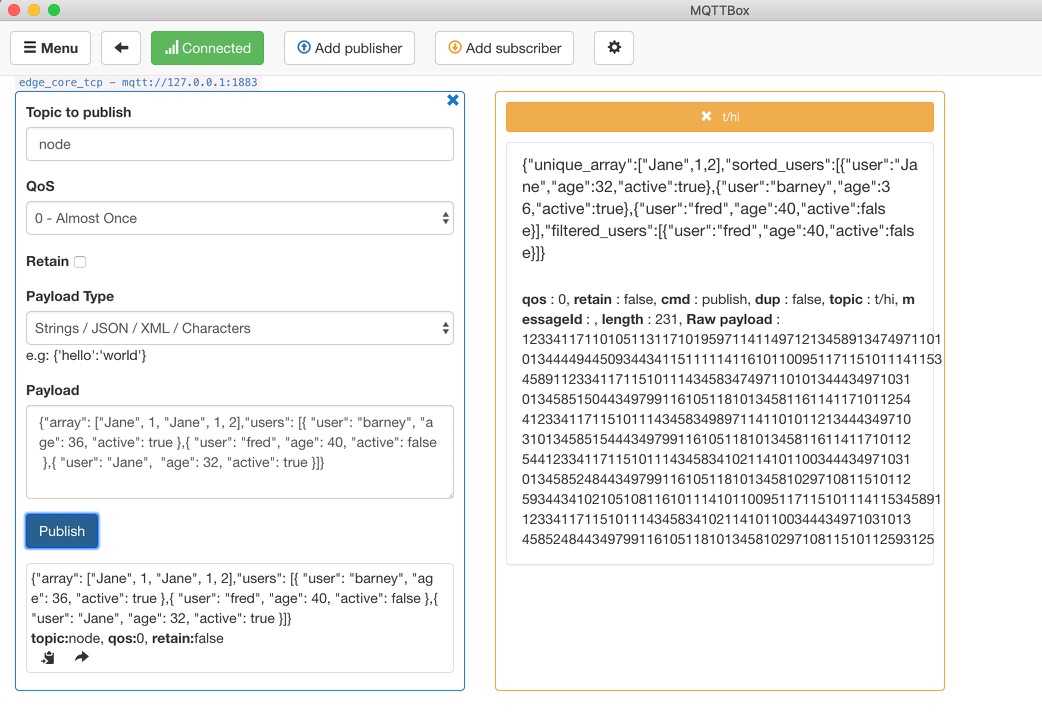How to import third-party libraries for Node runtime¶
Statement:
- The operating system as mentioned in this document is Ubuntu16.04.
- The version of runtime is Node8.5
- The MQTT client toolkit as mentioned in this document is MQTTBox.
- In this document, we give an example about how import the third-party library
Lodash. - In this article, the service created based on the Hub module is called
localhubservice. And for the test case mentioned here, thelocalhubservice, function calculation service, and other services are configured as follows:
# The configuration of Local Hub service
# Configuration file location is: var/db/baetyl/localhub-conf/service.yml
listen:
- tcp://0.0.0.0:1883
principals:
- username: 'test'
password: 'hahaha'
permissions:
- action: 'pub'
permit: ['#']
- action: 'sub'
permit: ['#']
# The configuration of Local Function Manager service
# Configuration file location is: var/db/baetyl/function-manager-conf/service.yml
hub:
address: tcp://localhub:1883
username: test
password: hahaha
rules:
- clientid: localfunc-1
subscribe:
topic: node
function:
name: sayhi
publish:
topic: t/hi
functions:
- name: sayhi
service: function-sayhi
instance:
min: 0
max: 10
idletime: 1m
# The configuration of application.yml
# Configuration file location is: var/db/baetyl/application.yml
version: v0
services:
- name: localhub
image: hub.baidubce.com/baetyl/baetyl-hub
replica: 1
ports:
- 1883:1883
mounts:
- name: localhub-conf
path: etc/baetyl
readonly: true
- name: localhub-data
path: var/db/baetyl/data
- name: localhub-log
path: var/log/baetyl
- name: function-manager
image: hub.baidubce.com/baetyl/baetyl-function-manager
replica: 1
mounts:
- name: function-manager-conf
path: etc/baetyl
readonly: true
- name: function-manager-log
path: var/log/baetyl
- name: function-sayhi
image: hub.baidubce.com/baetyl/baetyl-function-node85
replica: 0
mounts:
- name: function-sayjs-conf
path: etc/baetyl
readonly: true
- name: function-sayjs-code
path: var/db/baetyl/function-sayhi
readonly: true
volumes:
# hub
- name: localhub-conf
path: var/db/baetyl/localhub-conf
- name: localhub-data
path: var/db/baetyl/localhub-data
- name: localhub-log
path: var/db/baetyl/localhub-log
# function manager
- name: function-manager-conf
path: var/db/baetyl/function-manager-conf
- name: function-manager-log
path: var/db/baetyl/function-manager-log
# function node runtime sayhi
- name: function-sayjs-conf
path: var/db/baetyl/function-sayjs-conf
- name: function-sayjs-code
path: var/db/baetyl/function-sayjs-code
Generally, using the Node Standard Library may not meet our needs. In fact, it is often necessary to import some third-party libraries. We’ll give one example below.
Import Lodash third-party libraries¶
Lodash is a modern JavaScript utility library delivering modularity, performance & extras. Baetyl support import third-party libraries such as Lodash to use its functions. How to import it, as shown below:
- Step 1: change path to the directory of javascripts, then install
Lodashpackage
cd /directory/of/Node/script
npm install --save lodash
- Step 2: import
Lodashin a javascript:
const _ = require('lodash');
- Step 3: execute your javascript:
node your_script.js
If the above operations are normal, the resulting script directory structure is as shown in the following figure.
 the directory of Lodash
the directory of Lodash
Now we write the script index.js to use functions provided by Lodash. More detailed contents are as follows:
#!/usr/bin/env node
const _ = require('lodash');
exports.handler = (event, context, callback) => {
result = {}
//remove repeating elements in array
result["unique_array"] = _.uniq(event['array']);
//sort
result['sorted_users'] = _.sortBy(event['users'], function(o) { return o.age; });
//filter
result['filtered_users'] = _.filter(event['users'], function(o) { return !o.active; });
callback(null, result);
}
The configuration of Node function runtime is as below:
# The configuration of Node function runtime
functions:
- name: 'sayhi'
handler: 'index.handler'
codedir: 'var/db/baetyl/function-sayhi'
First define the following json data as an input message:
{
"array": ["Jane", 1, "Jane", 1, 2],
"users": [
{ "user": "barney", "age": 36, "active": true },
{ "user": "fred", "age": 40, "active": false },
{ "user": "Jane", "age": 32, "active": true }
]
}
As above, after the localhub service receives the message sent to the topic node, it calls index.js script to execute the concrete logic to remove repeated elements, filter, sort of array in input data. The result is then fed back to the topic t/hi as an MQTT message. We subscribe to the topic t/hi via MQTTBox and we can observe the following message:
{
"unique_array": ["Jane", 1, 2],
"sorted_users": [
{ "user": "Jane", "age": 32, "active": true },
{ 'user': 'barney', "age": 36, "active": true },
{ "user": "fred", "age": 40, "active": false }
],
"filtered_users": [
{ "user": "fred", "age": 40, "active": false }
],
}
 using_lodash
using_lodash